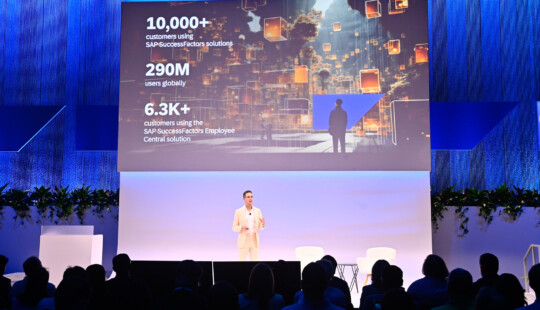Adam Grant, host of the WorkLife TED podcast, wants us to replace best practices and group brainstorming with mind-opening networks of people unafraid to challenge ideas so we can collaborate inclusively to do our best work. Oh, and we all have to work less.
Grant, who is also a bestselling author and organizational psychologist at the Wharton School of Business, had plenty of insights to share in a lively conversation with Jill Popelka, president of SAP SuccessFactors, during a broadcast of this year’s virtual SuccessConnect event.
Value Learning Cultures Over Performance Cultures
According to Grant, workplaces that value a traditional performance-based culture are ideal for short-term goal execution but fall short when it comes to innovation. Instead of best practices, he suggested calling them “better practices,” signaling that there is always room for improvement.
“If you don’t have a learning culture, you end up freezing yourself in time and basically crystallizing the best practices of the past that are no longer relevant to the present or unlikely to help you innovate in the future,” said Grant. “A learning culture is one where you’re not so committed to the tried-and-true ways that you’ve always done things that you close your mind to testing, learning, and experimenting with new ways of doing things…One way to get there is to abandon the idea of best practices altogether.”
Build a Network of People Who Challenge You
Expert group support in a learning culture, said Grant, consists of a “challenge network” of people who have the psychological safety to speak up – even if they don’t know how to fix a problem. Turn the age-old “suggestion box” into a “problem box” where people figure out what needs solving and rethink productive directions moving forward.
“Your challenge network is the group of thoughtful critics who you trust to hold up a mirror so you can see your own blind spots more clearly,” he said. “I’ve gone to some of the most disagreeable givers in my work life…and I’ve told them, ‘I know I haven’t always taken your criticism. Sometimes I’ve gotten defensive and other times I have been dismissive, and I regret that because I know I need you to challenge me to think again. So if you ever hesitate because you’re worried about hurting my feelings or hurting our relationship, don’t. The only way you can hurt me is by not telling me the truth.’”
Working Towards Inclusivity
Anyone who has ever been marginalized at a meeting knows that group brainstorming doesn’t work. Grant’s simple workaround is called “brainwriting,” which heads off group think and cultivates diversity of thought. While leaders still frame the problem and type of decision that needs to be made, they end up including every voice in the room before making their own opinion known.
“Prompt people in advance to let them generate their own ideas independently,” he said. “Once you’ve collected all the ideas, you begin to take advantage of the wisdom of crowds to evaluate and refine…People are more honest with you. They get more engaged and empowered. You also learn more and might have a better opinion at the end of the discussion.”
Take Care of People’s Emotional and Physical Well-Being
No expert session on work life these days would be complete without addressing employee burnout. Grant had tips to reduce demands on workers, give people more choices, and let them know help is available.
“Try to lighten the load on people, especially figuring out what their most stressful tasks are and trying to make sure they’re not overburdened with those,” he said. “We can’t always eliminate the demands of their job altogether, but we can give more choices and discretion about how to manage them…Support is the biggest part right now…We need compassionate leadership that takes action to alleviate other people’s pain.”
Worker Importance in Hybrid Workplace
When Popelka pointed out that organizations need to balance employee autonomy, cultural cohesion, and workforce productivity, Grant discussed the rising importance of people called “culture carriers.”
“Culture carriers [are] the people who disproportionately exemplify the values and norms of a team or an organization…They’ve become especially critical in a hybrid world where we can’t all be in the same room at the same time,” he said. “Make sure they’re visible in these critical moments where culture is shaped during recruiting and onboarding [and] in all-hands meetings. I want people to see them so that they can watch them in action…hear their stories, [and] learn the values and norms by osmosis.”
Fewer Work Hours Boosts Productivity
If Grant could do just one thing to change work for good, it would be to upend the quantity over quality workplace ethic.
“I would have people work less…I know of no evidence that people are more productive in eight unfocused, distracted hours a day than they could be in six highly concentrated hours a day,” he said. “Experiments show that if people know they can earn that fifth day off and turn it into a four-day week, they find lots of ways to be more efficient and effective, [and] to work smarter, as well as more creatively.”
Follow me @smgaler
This blog also appeared on SAP BrandVoice on Forbes.



